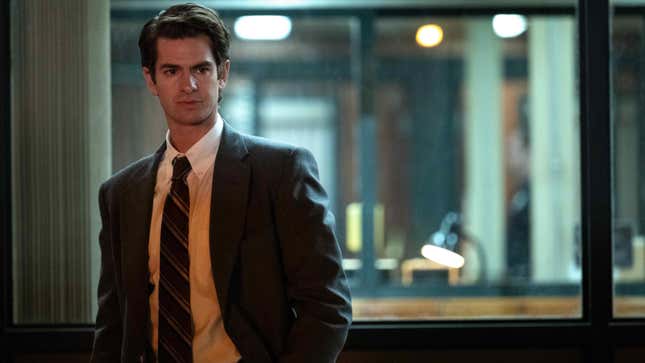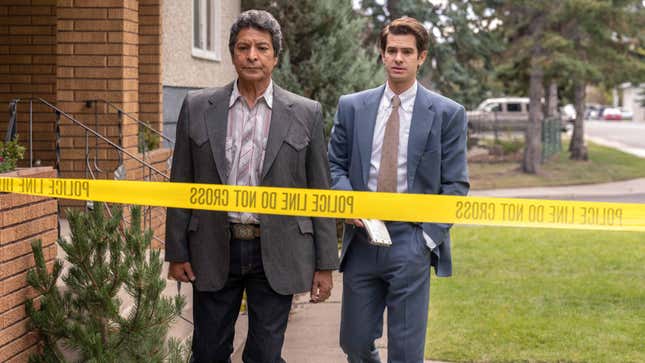
Jon Krakauer’s 2003 book Under The Banner Of Heaven is a shocking read, one that begins with the gruesome real-life murders of Brenda Lafferty and her 15-month-old daughter in 1984. The engrossing volume quickly establishes that it’s not so much a “whodunit” but a “whydunit” as it traces centuries of detailed Mormon history in an attempt to answer what might’ve led to their deaths. Adapting this complicated source material is no easy feat, but creator Dustin Lance Black (Milk) translates Krakauer’s work into an emotionally striking TV drama, in part due to his own upbringing in a Mormon household.
The show’s grand scope lies in its quietly sharp prodding of the divisions between fundamentalist Mormons and mainstream Latter-Day Saints, who reject older tenets of the religion, like polygamy and other harsher practices. (The phrase “blood atonement” gets mentioned a few times). UTBOH spans time to examine the origins of these issues, and how many decades later, they crucially impacted the lives of Brenda (Daisy Edgar-Jones) and her in-laws. To put it simply: It’s a ton of information that the book presents quite vividly. But the big difference in how it’s filtered on screen is the addition of fictional Detective Jeb Pyre (Andrew Garfield), a devout Mormon himself.
Jeb’s gradual push-and-pull with his church becomes central to UTBOH as he delves further into Brenda and her toddler Erica’s slayings. It’s a risky move to layer in his internal crisis as a manufactured subplot when the show is already weaving in multiple timelines: the actual investigation itself, a backstory of Brenda’s dynamic with her new family, and the relationship between the various Lafferty brothers over the years. The show also revisits the early 1800s when Joseph Smith (Andrew Burnap) founded Mormonism. Luckily, Jeb and his non-Mormon partner, Bill Taba (a sublime Gil Birmingham), wisely end up as the audience’s lens into UTBOH’s many threads.
Their initial prime suspect is Brenda’s husband, Allen (Billy Howle), who found his wife and child dead in their home in American Fork, Utah. Allen and Jeb scrutinize their perspectives on Mormonism through endless interrogations. It also becomes clear that darker forces are at play here, casting suspicion on two of Allen’s brothers, Dan (Wyatt Russell) and Ron (Sam Worthington), instead. Ruled under the thumb of a strict father, Ammon (Christopher Heyerdahl), both of them believed they were the chosen ones, born to rule as the next prophet, and anyone who opposed them had to pay a heavy price. Brenda, a more forward-thinking Mormon from Idaho, falls under that umbrella.
Jeb’s conversation with Allen helps lift a veil for him. He never had a reason to doubt his faith before. After all, Jeb leads a pious and happy life with his spouse, Rebecca (Adelaide Clemens), and their two young girls, while also caring for his aging mother. No wonder this heinous crime affects him deeply. But UTBOH takes care not to turn his overall religion into the villain; it’s the men who believe they can wield it for their own power. An enigmatic Garfield delivers a subdued performance as he tackles the crushing toll this case takes on Jeb, a soft-hearted man. Garfield’s work is loaded with silent, nuanced expressions that counteract nicely with the provocative flair of Howle, Russell, Worthington, and Rory Culkin, who plays another Lafferty brother, Samuel.

To the series’ credit, the writing is incredibly thorough as it covers the immense Mormon background going back to the 1820s. But a drawback of the intricacy is that the dialogue often borders on exposition. Jeb’s conversations with Allen, especially in the early outings, are far too repetitive, slowing down the pace of UTBOH. Don’t get us wrong: Howle and Garfield manage to keep their characters’ discourse riveting and never boring (for the most part), but it’s certainly much lengthier than needed. Each episode clocks in at just over an hour, and none of them are judicious with how to best occupy that 60-minute plus runtime. Sluggish pacing aside, the show also can’t make its Joseph Smith flashbacks nearly as interesting as the present-day murder case.
Despite part of the show feeling like a knowledge dump, UTBOH still stands out as one of the more sympathetic true-crime dramas in recent times. Even in the opening scene, as Jeb enters Brenda and Allen’s house, the audience doesn’t get a glimpse of the bloody gore. Once again, Jeb is the lens here. His quivering face as he explores the area is enough to understand how barbaric the crime scene is. Similarly, the show spends time fleshing out Brenda as the woman she once was; she’s not just a victim. Edgar-Jones radiates on-screen, bringing vitality and depth to her character.
More than anything, UTBOH is a thoughtful and evocative display of reckoning with one’s faith. It doesn’t match up to Krakauer’s sprawling volume, but it’s still an earnest effort from the whole cast and crew, and deserving of its own spotlight.